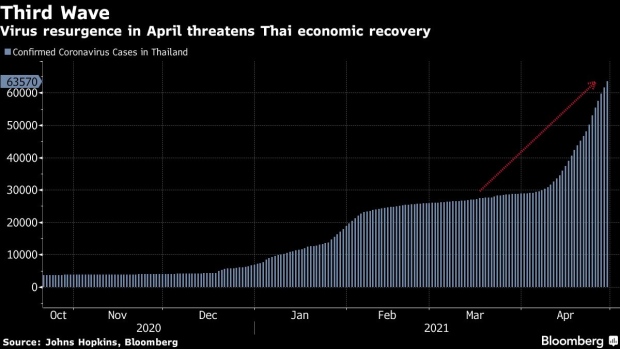May 5, 2021
Thailand Holds Rates, Warns on Growth Amid Its Worst Covid Wave
, Bloomberg News

(Bloomberg) -- Thailand’s central bank kept its benchmark interest rate unchanged for an eighth straight meeting, warning its forecast for an economic recovery was threatened by the country’s biggest virus wave since the pandemic began.
The Bank of Thailand held the policy rate Wednesday at 0.5% in a unanimous decision, as expected by all 22 economists in a Bloomberg survey.
Thailand’s total Covid-19 caseload has more than doubled since early April, with a flareup that began in Bangkok nightlife venues spreading nationwide. The government tightened restrictions starting May 1, potentially slowing a rebound from the economy’s deepest contraction in more than two decades.
“Vaccine procurement and distribution is the hero for economic recovery. Fiscal and monetary policies play supporting roles,” Assistant Governor Titanun Mallikamas told reporters in Bangkok. With the central bank’s forecast of 3% economic growth this year at risk, he said it was prudent to preserve limited policy space for now, but that the bank can use “additional policy tools” if needed.
The baht was 0.2% lower at 31.195 to the U.S. dollar as of 2:20 p.m. local time. The benchmark SET Index held its decline of 1.8% when trading resumed after the lunch break.
Extra Spending
The government recently prepared an additional budget worth 380 billion baht ($12.2 billion) to boost the economy, which had just started to recover from a second wave of infections that began in mid-December. The Finance Ministry last week cut its GDP forecast to 2.3% growth, from 2.8% expected earlier, to factor in the impact of latest wave, especially on tourist arrivals.
The economy will recover more slowly than anticipated due to the recent outbreak, Titanun said, identifying the speed of vaccinations and fragile smaller businesses as particular concerns. The central bank’s forecast of 3% economic growth this year may be at risk, he said.
“This will go down as the weakest recovery in Asia from a record economic slump last year,” said Prakash Sakpal, senior economist at ING Groep NV in Singapore, who cut his 2021 GDP growth forecast to 2.1% from 2.8%. “Stable monetary policy remains the baseline for this year, leaving all the heavy lifting for supporting growth to fiscal policy.”
Other points from Titanun’s briefing:
- Inflation may accelerate in the second quarter due to a low base of comparison in 2020, remaining within the target range in the medium term
- Stimulus measures can help support the economy in the short term
- If the country can administer 100 million vaccine doses, it could receive 15 million visitors next year and achieve 4.7% GDP growth
(Updates with more details throughout.)
©2021 Bloomberg L.P.